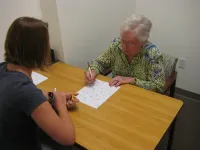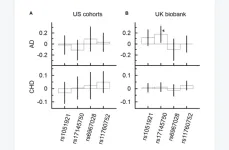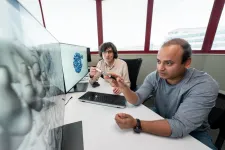(Press-News.org) The American Society for Biochemistry and Molecular Biology announced the 12 delegates who will participate in the society’s Advocacy Training Program this summer.
The ATP is a three-month summer externship that provides hands-on science policy and advocacy training and experience. After completing the educational component of the program, delegates will visit Capitol Hill to meet with policymakers in 2024. The ASBMB public affairs department runs the program.
The society has trained 42 ASBMB members in four ATP cohorts, providing the foundational knowledge, skills and tools they need to advocate in their local communities and to their legislators. (Learn more about the experiences and achievements of past ATP delegates.)
This summer’s program will feature sessions across a wide range of science policy topics, including the appropriations process and the role the executive branch plays in shaping science policies.
Sarina Neote, the ASBMB's public affairs director, said she wants all scientists to participate in science policy and advocacy, not just those who plan to pursue a career on Capitol Hill.
“Congressional members and federal agencies need to hear from young scientists who are instrumental in driving scientific discovery,” Neote said. “Many congressional policies and funding decisions immediately affect their careers. I am extremely excited about this strong cohort of the Advocacy Training Program. We have a diverse group of individuals who will all learn to be compelling advocates for the future of the American research enterprise.”
Emily Pitsch, an ATP alumna, ASBMB Public Affairs Advisory Committee member and graduate student at the University of Utah, said she is excited for the next class to learn to merge their interests in science and policy. As the only Ph.D. candidate on the PAAC, she recently traveled to Capitol Hill for ASBMB’s Hill Day to meet with her elected officials and advocate for fundamental science research funding.
“I gained a much deeper understanding of policy for science funding at the federal level,” Pitsch said. “The ATP is important because there are not many opportunities for early-career scientists to learn about science policy, and we were able to practice what we learned about during the program. So, the ATP prepared us to apply what we learned in the real world when the program was over.”
Learn more about the participants below.
Benjamin Duewell
Benjamin Duewell, a Ph.D. candidate at the University of Oregon, studies protein biochemistry and is interested in the mechanisms that enzymes leverage to localize to subcellular areas. He previously studied biochemistry and molecular biology at the University of California, Irvine.
“As a child of schoolteachers, I grew up seeing the effect that public policy had on classrooms,” Duewell said. “I have since focused my time working to understand the systems that create barriers between people and education. I hope to continue learning about these systems as an ATP delegate, while gaining new knowledge and skills to better advocate for their reform and restructure.”
Chloe Kirk
Chloe Kirk, a Ph.D. candidate at the University of Miami, is studying the ways cells respond to stress and the cellular disassembly of physiological amyloids. Kirk is involved with science outreach such as participating in the student government at UM, organizing science field trips with local high schools, blogging about her life as a Ph.D. candidate, volunteering with Skype a Scientist and writing for ASBMB Today.
“As an Advocacy Training Program (delegate), I plan to learn how I can harness my experience in science research and communication to advocate for increased funding in biomedical research and STEM education resources,” Kirk said.
Faith Bowman
Faith Bowman, a Ph.D. candidate at the University of Utah, researches the role of a potential nutrient sensor and its effects on glucose metabolism in diabetes and heart failure. Faith is an Indigenous scholar from the Stockbridge–Munsee Band of Mohican Nation in Wisconsin. She is also an active advocate for increased diversity, equity, inclusion and belonging in science at her university.
“As an ATP delegate, I hope to gain critical skills in initiating and engaging with public policymakers, aligning the community's needs with policymakers' goals and distilling those ideas into actionable plans to improve health equity with policy grounded in evidence-based research,” Bowman said.
Isha Verma
Isha Verma, a postdoctoral fellow at the University of Michigan, investigates epilepsy mechanisms using patient stem cell–derived neural cells and brain organoids. Verma earned her Ph.D. in stem cell biology at the Indian Institute of Science and conducts scientific outreach with K–12 students through Skype a Scientist.
“As a part of the ATP, I am excited to learn about the opportunities to interact with congressional members and advocate for research funding,” Verma said.
Joselyn Landazuri Vinueza
Joselyn Landazuri Vinueza, a Ph.D. candidate at the University of Washington, researches how viruses cause cancer with the goal of discovering new therapeutic treatments. She is a member of the diversity committee in her department and has volunteered with Seeds of Success, where she mentors Puerto Rican girls in middle and high school who are interested in science.
“I am looking forward to learning how to advocate for federal funding to increase minority representation in STEM fields through the ATP,” Landazuri Vinueza said.
Justin Wang
Justin Wang, a Ph.D. candidate at Scripps Research in La Jolla, California, studies how to inhibit cancer growth and metastasis by exploiting transfer RNA synthases. He served as president of the Graduate Student Council at Scripps and advocates for a more equitable and inclusive environment for trainees of all backgrounds.
“By participating in the ATP, I hope to gain the skills and know-how to improve research culture through policy and translate scientific findings into impactful policy changes,” Wang said.
Katie Scott
Katie Scott, a neuroscience Ph.D. candidate at the University of Iowa, studies novel gene therapies for genetic neurodevelopment disorders with a focus on sodium channels. In her free time, she volunteers as a swimming teacher and as a caregiver at an animal rescue.
“I am hoping to build my knowledge on how to create an inclusive and inviting atmosphere to learn about science for my community,” Scott said. “I am passionate about accessibility and advocating for inclusive learning spaces.”
Kira Mills
Kira Mills, a Ph.D. candidate at the University of Texas at Dallas, uses computational biochemistry to understand the mechanism of ion-transporting proteins. They received their bachelor’s degree in chemistry from Texas A&M University–Commerce in 2018 as a McNair Scholar.
“As a first-generation student from a low-income background, I have seen firsthand the disparities in public school education throughout the U.S., within Texas specifically, and want to work toward bridging the gap and ensuring all students have access to quality science education,” Mills said. “I hope the ATP will provide the necessary knowledge and skills to be able to make effective changes in science education policy and to be able to impart the importance of education to our politicians.”
Maksim Dolmat
Maksim Dolmat, a Ph.D. candidate at the University of Alabama at Birmingham, conducts research at the intersection of polymer chemistry, nanotechnology and biomedical science. He previously worked as a chemist in academia and industry in Belarus.
“I hope to bring attention to the complex relationships between climate change and cancer risks through modifiable risk factors,” Dolmat said. “I aim to become well versed in scientific policy, develop a well-placed network that will enable me to obtain the resources to implement changes and understand the intricacies of the federal government.”
Mericka McCabe
Mericka McCabe, a Ph.D. candidate at Albert Einstein College of Medicine, studies small molecule regulators of autophagy. She is involved in Women in Autophagy, a nonprofit group that provides free resources and programming to support young scientists globally.
“Through the ATP, I hope to gain the confidence and skill set to work with policymakers and advocate on behalf of my fellow scientists,” McCabe said.
Nidhi Shukla
Nidhi Shukla, a postdoctoral fellow at Case Western Reserve University, focuses on how protein sequence variants affect disease and is particularly interested in exploring the amino acid compatibility between virus and host. Last year, she served as the president of the CWRU Postdoc Association, for which she organized events to foster professional development and well-being.
“I am excited to participate in the Advocacy Training Program and hope to gain a deeper understanding of the policymaking process and develop the skills and knowledge necessary to advocate for policies that align with my values and priorities,” Shukla said. “I also hope to build connections with other advocates and gain insights into best practices for community building and policy advocacy.”
Sydney Haas
Sydney Haas is an undergraduate at the New College of Florida, where she is majoring in marine biology. She conducts research on the nutrient concentrations in the Sarasota Bay.
“With ATP, I have three main goals: learn what strategies are most effective for fighting for educational freedom and prosperity for both the students and professors, learn how to communicate well with legislators and decision-makers and learn how to help others at the New College of Florida,” Haas said.
About the American Society for Biochemistry and Molecular Biology (ASBMB) The ASBMB is a nonprofit scientific and educational organization with more than 12,000 members worldwide. Founded in 1906 to advance the science of biochemistry and molecular biology, the society publishes three peer-reviewed journals, advocates for funding of basic research and education, supports science education at all levels, and promotes the diversity of individuals entering the scientific workforce. For more information about the ASBMB, visit www.asbmb.org.
END
Meet the 2023 ASBMB Advocacy Training Program delegates
The fifth cohort will learn how to advocate for science funding and support this summer and visit Capitol Hill in 2024
2023-05-24
ELSE PRESS RELEASES FROM THIS DATE:
Does having Alzheimer’s genes increase your risk of epilepsy?
2023-05-24
MINNEAPOLIS – People with a genetic predisposition for Alzheimer’s disease may have an increased risk of epilepsy and people with a certain type of epilepsy may have an increased risk of developing Alzheimer’s disease, according to a study published in the May 24, 2023, online issue of Neurology®, the medical journal of the American Academy of Neurology.
“Our research found that not only are people with Alzheimer’s disease more likely to develop epilepsy, but also that those with focal epilepsy, which accounts for ...
New study shows 1 in 5 “healthy” individuals actually have the metabolism of a prediabetic
2023-05-24
Scientists at Klick Labs have developed a new way to catch the earliest signs the human body is failing to control blood glucose levels, before it reaches prediabetic levels in patients.
In findings published today in Mayo Clinic Proceedings: Digital Health, researchers outlined a new method of analysis that flags a precursor to prediabetes called impaired glucose homeostasis (IGH). When they applied their patented mathematical method to data obtained from continuous glucose monitors (CGMs), scientists found about one in five study participants, considered healthy by medical standards, actually had glucose metabolism similar to those with prediabetes.
“For people ...
New UCI-led research shows people who live to be 90+ with superior thinking skills are resilient to Alzheimer’s pathology in their brains
2023-05-24
Irvine, CA – May 24, 2023 – A University of California, Irvine-led team of researchers have discovered that the oldest-old, those who live to be 90+ and have superior cognitive skills, have similar levels of brain pathology as Alzheimer’s patients, however, they also have less brain pathology of other neurodegenerative diseases that cause memory and thinking problems.
The study, “Superior Global Cognition in Oldest-Old is Associated with Resistance to Neurodegenerative Pathologies: Results from the 90+ Study,” was published in the Journal of Alzheimer’s Disease.
“People ...
Survival pathway and therapeutic target in metastatic colorectal and pancreatic cancer
2023-05-24
“Recent findings suggest that neurodegenerative and cardiovascular diseases may have overlapping etiologies [...]”
BUFFALO, NY- May 24, 2023 – A new research paper was published in Aging (listed by MEDLINE/PubMed as "Aging (Albany NY)" and "Aging-US" by Web of Science) Volume 15, Issue 9, entitled, “Exogenous exposures shape genetic predisposition to lipids, Alzheimer’s, and coronary heart disease in the MLXIPL gene locus.”
In this new study, researchers Yury Loika, Elena Loiko, Fan Feng, Eric Stallard, Anatoliy I. Yashin, Konstantin Arbeev, Allison L. Kuipers, Mary F. Feitosa, Michael A. Province, and Alexander ...
Researchers identify strong T-cell response in first-in-human nanoparticle HIV vaccine
2023-05-24
SEATTLE – MAY 24, 2023 – Researchers from Fred Hutchinson Cancer Center in Seattle, Scripps Research in La Jolla, California, IAVI and other collaborating institutions have characterized robust T-cell responses in volunteers participating in the IAVI G001 Phase 1 clinical trial to test the safety and immune response of a self-assembling nanoparticle HIV vaccine.
Their work, published in Science Translational Medicine, signals a major step toward development of a vaccine approach to end the HIV/AIDS ...
Clinicians supporting cancer patients with taste loss need educational materials and training
2023-05-24
AMHERST, Mass. – While an overwhelming majority of cancer patients experience taste disruption from their disease or treatment, they have consistently reported a lack of support from their doctors about this troubling side effect, according to research.
A new study by the University of Massachusetts Amherst, focusing for the first time on the issue from the cancer clinicians’ point of view, reveals not a lack of concern about their patients’ taste loss but a lack of access to educational materials, ...
Epigenetic landscape modulates pioneer transcription factor binding
2023-05-24
(Memphis, Tenn.—May 24, 2023) Like thread tightly wrapped around a spool, DNA is wrapped around histones and packaged into structures called nucleosomes. Scientists at St. Jude Children’s Research Hospital are exploring how a type of transcription factor called a pioneer transcription factor accesses DNA even when it is tightly wound. Their work revealed how the epigenetic landscape influences transcription factor binding. Problems with transcription have been implicated in numerous cancers, so this more detailed understanding of the process may aid in developing future therapeutics. The study ...
A popular compostable plastic doesn’t break down in the ocean
2023-05-24
A widely used compostable plastic persists unchanged in marine environments for at least 14 months, according to a new study in the open-access journal PLOS ONE by Sarah-Jeanne Royer and colleagues from Scripps Institution of Oceanography at the University of California, San Diego. The study highlights the distinction between textile materials that can be composted in a controlled, industrial setting (PLA), and the ones that can undergo biodegradation in natural environments (cellulose-based textiles).
The accumulation and persistence of oil-based plastic waste ...
Physical activity linked to higher pain tolerance
2023-05-24
A new analysis of data from more than 10,000 adults shows that people who were physically active had higher pain tolerance than those who were sedentary, and that those with a higher level of activity had a higher level of pain tolerance. Anders Årnes of the University Hospital of North Norway, Tromsø, and colleagues present these findings in the open-access journal PLOS ONE on May 24, 2023.
Prior research has suggested the possibility that a habit of engaging in a higher level of physical activity might help ease or prevent chronic pain by boosting pain tolerance. However, most studies on this topic have been small or focused on narrow groups of people.
To help clarify the ...
U.S. teens who are food insecure are more likely to engage in emotional eating and consume sugar-sweetened beverages and junk foods
2023-05-24
Article URL: https://journals.plos.org/plosone/article?id=10.1371/journal.pone.0285446
Article Title: Psychosocial correlates in patterns of adolescent emotional eating and dietary consumption
Author Countries: USA
Funding: The authors received no specific funding for this work. END ...
LAST 30 PRESS RELEASES:
Engineers sharpen gene-editing tools to target cystic fibrosis
Pets can help older adults’ health & well-being, but may strain budgets too
First evidence of WHO ‘critical priority’ fungal pathogen becoming more deadly when co-infected with tuberculosis
World-first safety guide for public use of AI health chatbots
Women may face heart attack risk with a lower plaque level than men
Proximity to nuclear power plants associated with increased cancer mortality
Women’s risk of major cardiac events emerges at lower coronary plaque burden compared to men
Peatland lakes in the Congo Basin release carbon that is thousands of years old
Breadcrumbs lead to fossil free production of everyday goods
New computation method for climate extremes: Researchers at the University of Graz reveal tenfold increase of heat over Europe
Does mental health affect mortality risk in adults with cancer?
EANM launches new award to accelerate alpha radioligand therapy research
Globe-trotting ancient ‘sea-salamander’ fossils rediscovered from Australia’s dawn of the Age of Dinosaurs
Roadmap for Europe’s biodiversity monitoring system
Novel camel antimicrobial peptides show promise against drug-resistant bacteria
Scientists discover why we know when to stop scratching an itch
A hidden reason inner ear cells die – and what it means for preventing hearing loss
Researchers discover how tuberculosis bacteria use a “stealth” mechanism to evade the immune system
New microscopy technique lets scientists see cells in unprecedented detail and color
Sometimes less is more: Scientists rethink how to pack medicine into tiny delivery capsules
Scientists build low-cost microscope to study living cells in zero gravity
The Biophysical Journal names Denis V. Titov the 2025 Paper of the Year-Early Career Investigator awardee
Scientists show how your body senses cold—and why menthol feels cool
Scientists deliver new molecule for getting DNA into cells
Study reveals insights about brain regions linked to OCD, informing potential treatments
Does ocean saltiness influence El Niño?
2026 Young Investigators: ONR celebrates new talent tackling warfighter challenges
Genetics help explain who gets the ‘telltale tingle’ from music, art and literature
Many Americans misunderstand medical aid in dying laws
Researchers publish landmark infectious disease study in ‘Science’
[Press-News.org] Meet the 2023 ASBMB Advocacy Training Program delegatesThe fifth cohort will learn how to advocate for science funding and support this summer and visit Capitol Hill in 2024





